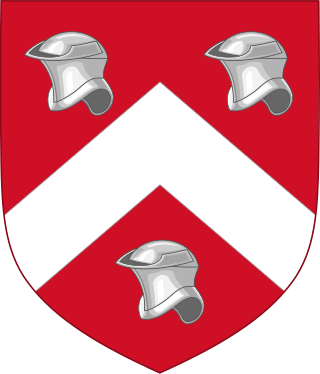
Sir Owen Tudor was a Welsh courtier and the second husband of Queen Catherine of Valois (1401–1437), widow of King Henry V of England. He was the grandfather of Henry VII, founder of the Tudor dynasty.

Uther Pendragon (Brittonic), also known as King Uther, was a legendary King of the Britons and father of King Arthur.
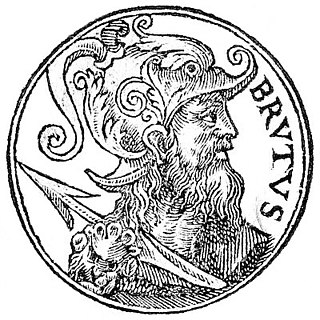
Brutus, also called Brute of Troy, is a fictional character who is depicted as a legendary descendant of the Trojan hero Aeneas, known in medieval British legend as the eponymous founder and first king of Britain. This legend first appears in the Historia Brittonum, an anonymous 9th-century historical compilation to which commentary was added by Nennius, but is best known from the account given by the 12th-century chronicler Geoffrey of Monmouth in his Historia Regum Britanniae.
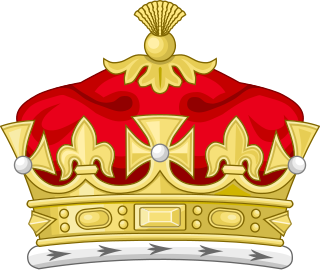
Duke of Clarence was a substantive title created three times in the Peerage of England. The title Duke of Clarence and St Andrews has also been created in the Peerage of Great Britain, and Duke of Clarence and Avondale and Earl of Clarence in the Peerage of the United Kingdom. The titles have traditionally been awarded to junior members of the English and British royal family, and all are now extinct.

Cadwaladr ap Cadwallon was king of Gwynedd in Wales from around 655 to 682 AD. Two devastating plagues happened during his reign, one in 664 and the other in 682; he himself was a victim of the second. Little else is known of his reign.
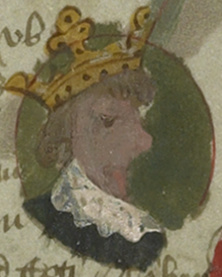
Camber, also Kamber, was the legendary first king of Cambria, according to the Geoffrey of Monmouth in the first part of his influential 12th-century pseudohistory Historia Regum Britanniae. According to Geoffrey, Cambria, the classical name for Wales, was named for him.
Gwendolen, also known as Gwendolin, or Gwendolyn was a legendary ruler of ancient Britain. She came to power in 1115BC.
The Trojan genealogy of Nennius was written in the Historia Brittonum of Nennius and was created to merge Greek mythology with Christian themes. As a description of the genealogical line of Aeneas of Troy, Brutus of Britain, and Romulus and Remus, the founders of Rome, it is an example of the foundation genealogies found not only in early Irish, Welsh and Saxon texts but also in Roman sources.
Mempricius was a legendary king of the Britons, as recounted by Geoffrey of Monmouth. He came to power in 1060BC. He was the son of King Maddan, brother of Malin, and father of king Ebraucus.
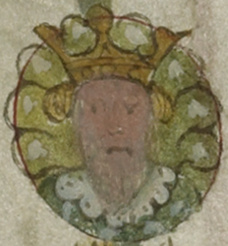
Brutus Greenshield was a legendary king of the Britons as accounted by Geoffrey of Monmouth. He was the son of King Ebraucus and came to power in 1001BC.

Leil was a legendary king of the Britons as accounted by Geoffrey of Monmouth. He was the son of King Brutus Greenshield and came to power in 989BC.

Historia regum Britanniae, originally called De gestis Britonum, is a pseudohistorical account of British history, written around 1136 by Geoffrey of Monmouth. It chronicles the lives of the kings of the Britons over the course of two thousand years, beginning with the Trojans founding the British nation and continuing until the Anglo-Saxons assumed control of much of Britain around the 7th century. It is one of the central pieces of the Matter of Britain.
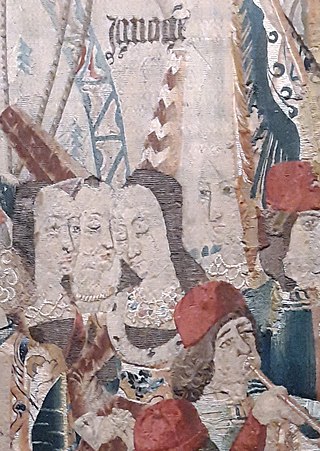
Innogen is a character in the Historia Regum Britanniae and subsequent medieval British pseudo-history. She was said to have been a Greek princess, the daughter of King Pandrasus, and to have become Britain's first Queen consort as the wife of Brutus of Troy, the purported first king of Britain who was said to have lived around the 12th century BC. Her sons Locrinus, Camber, and Albanactus went on to rule Loegria, Cambria, and Alba respectively.

The kings of Alba Longa, or Alban kings, were a series of legendary kings of Latium, who ruled from the ancient city of Alba Longa. In the mythic tradition of ancient Rome, they fill the 400-year gap between the settlement of Aeneas in Italy and the founding of the city of Rome by Romulus. It was this line of descent to which the Julii claimed kinship. The traditional line of the Alban kings ends with Numitor, the grandfather of Romulus and Remus. One later king, Gaius Cluilius, is mentioned by Roman historians, although his relation to the original line, if any, is unknown; and after his death, a few generations after the time of Romulus, the city was destroyed by Tullus Hostilius, the third King of Rome, and its population transferred to Alba's daughter city.

Alba Silvius was in Roman mythology the fifth king of Alba Longa. He was the son of Latinus Silvius and the father of Atys. He reigned thirty-nine years.
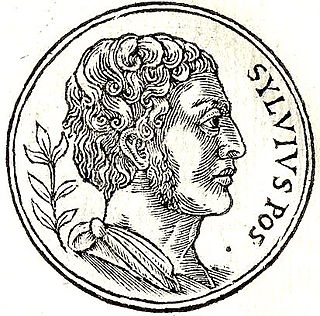
In Roman mythology, Silvius or Silvius Postumus, was either the son of Aeneas and Lavinia or the son of Ascanius. He succeeded Ascanius as King of Alba Longa and reigned 1139–1110 BC.

Sir John Prise (1501/2–1555) was a Welsh public notary, who acted as a royal agent and visitor of the monasteries. He was also a scholar, associated with the first Welsh printed publication Yn y lhyvyr hwnn. He was a Member (MP) of the Parliament of England for Breconshire in 1547; Hereford October 1553; Ludlow April 1554; and Ludgershall November 1554.

Gogmagog was a legendary giant in Welsh and later English mythology. According to Geoffrey of Monmouth's Historia Regum Britanniae, he was a giant inhabitant of Albion, thrown off a cliff during a wrestling match with Corineus. Gogmagog was the last of the Giants found by Brutus and his men inhabiting the land of Albion.
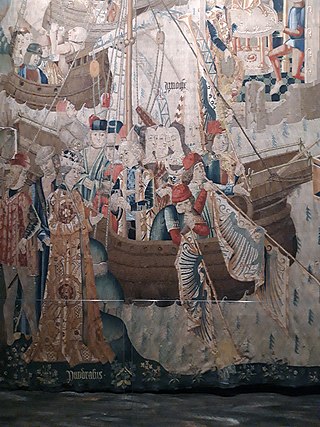
Pandrasus is the fictional king of Greece and father of Innogen in Geoffrey of Monmouth's pseudo-history Historia Regum Britanniae.
















